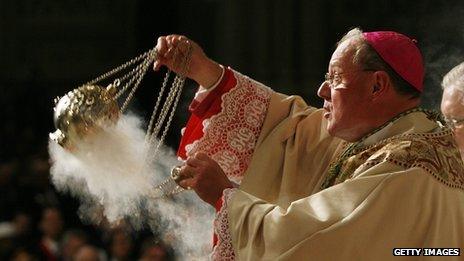Can Catholic teaching justify Ryan plan?
- Published

When Congressman Paul Ryan invoked Catholic Social Teaching to defend his budget of steep cuts in both spending and taxes, it was almost inevitable that he would invite a sharp rebuke from the Jesuit priest-professors of Georgetown University.
In defending his agenda for shrinking the federal government, Paul Ryan specifically talked about Subsidiarity, a principle of Catholic social teaching that was developed by a German theologian and appeared in Pope Leo XIII's encyclical, Rerum Novarum in 1891.
As Mr Ryan suggested, it emphasises the importance of local communities and institutions such as the family, the church and charities.
It suggests they empower an individual and support the principle of the dignity of each person.
But the Catholic theologians and bishops who have so vigorously condemned Mr Ryan's comments say that it cannot be reduced to the notion that "Big Government is bad".
Ethical imperative
They argue that subsidiarity is more than this and includes an ethical imperative to use all forms of communal organisation to support the dignity and autonomy of the individual.
Paul Ryan is not the first politician to use Catholic teaching for a policy platform
It was developed to protect the individual, especially the vulnerable - the poor, the old and the sick.
The critics of Mr Ryan here protest that his raft of planned cuts to poverty-reduction and healthcare programmes directly undercuts Catholic social teaching in this regard.
Secondly, Catholic Social Teaching is about more than the principle of subsidiarity. Central to it is the concept of "the common good".
This too was articulated in Pope Leo XIII's encyclical but it can be traced back to Aristotle and was developed by St Thomas Aquinas, who made it the core of moral theology.
It fleshes out the ethical imperative above and charts a course for a healthy society. Leo XIII suggested a half-way house between laissez faire capitalism and the forms of government, such as communism, that subordinate the individual to the state.
Of course, this leaves Catholic teaching open to interpretation and Mr Ryan isn't the first to use it to give philosophical substance to his political platform.
On the Democratic side, Presidents Obama and Clinton have both used "the common good" as a rallying cry for a more progressive politics that embraces economic and social justice.